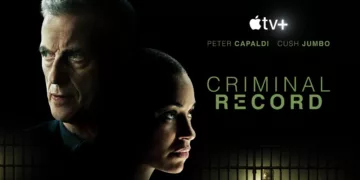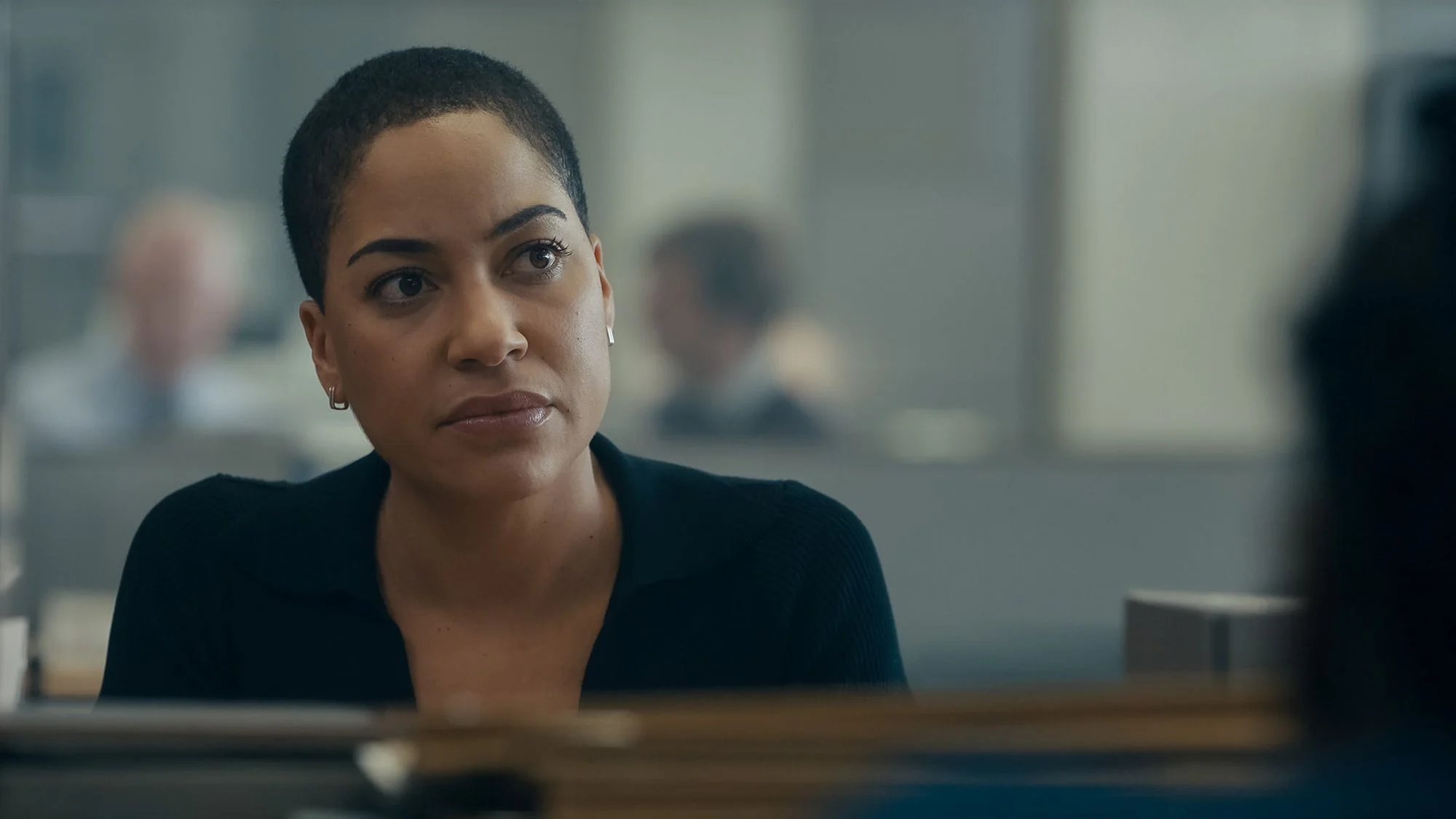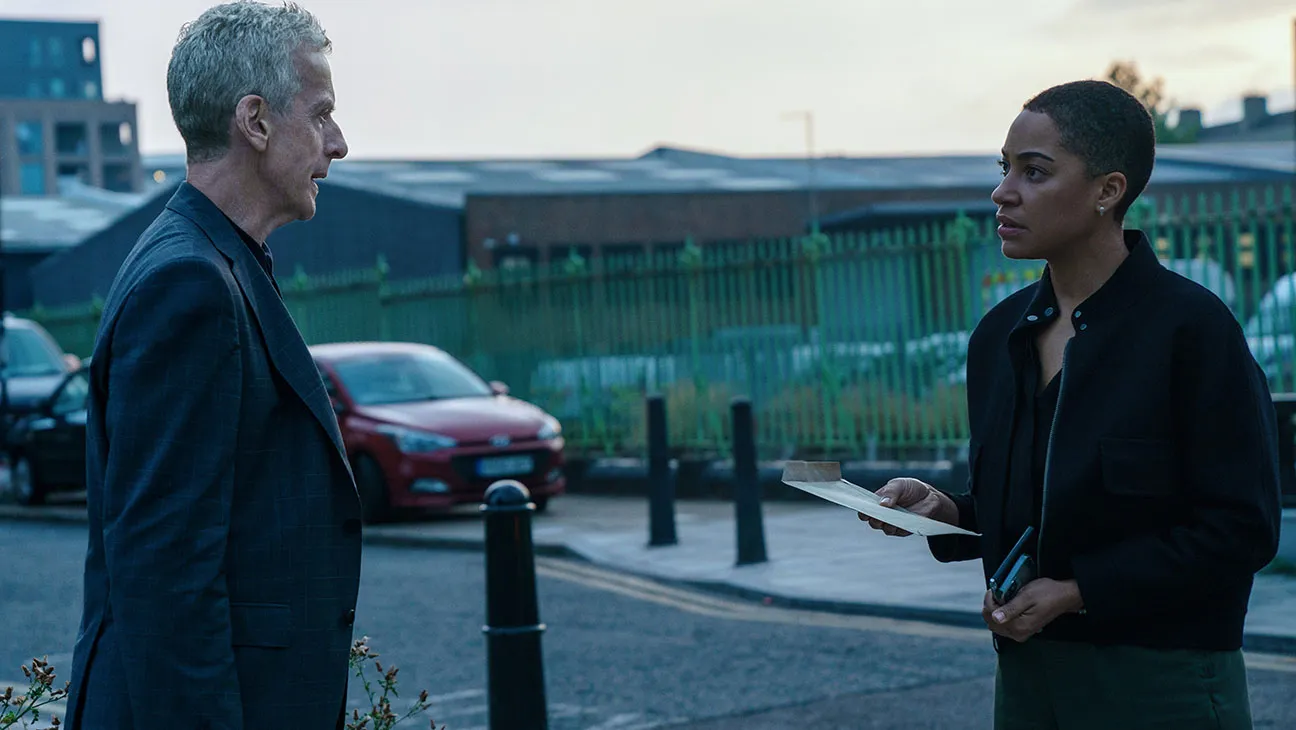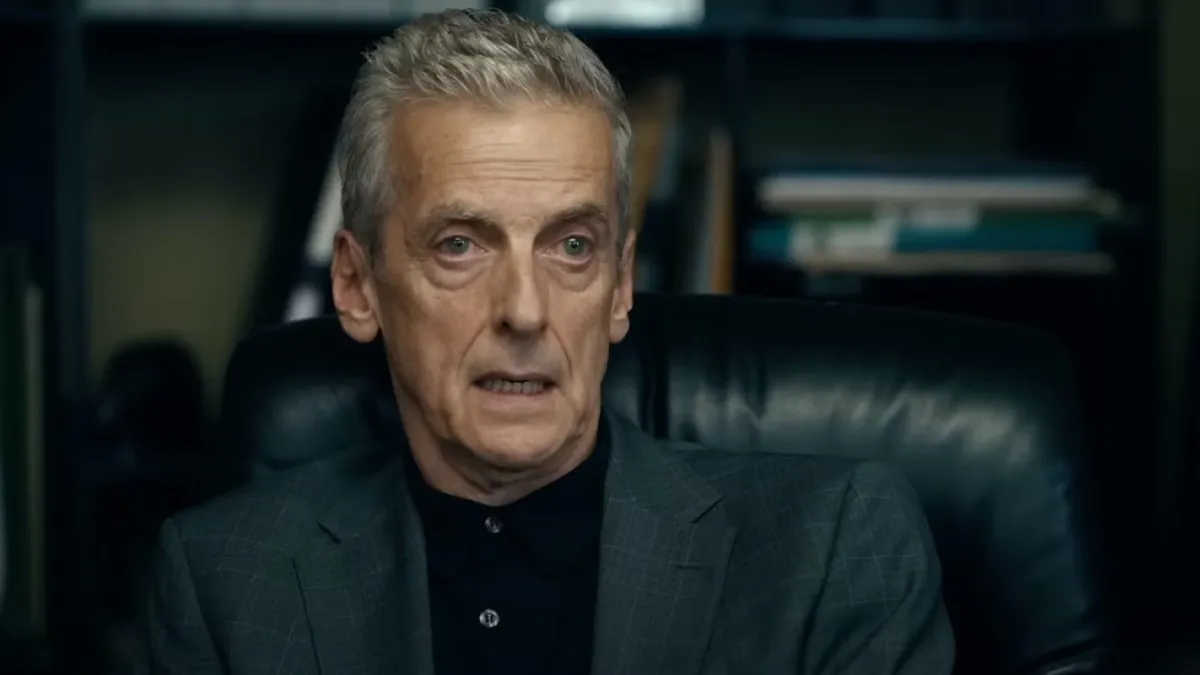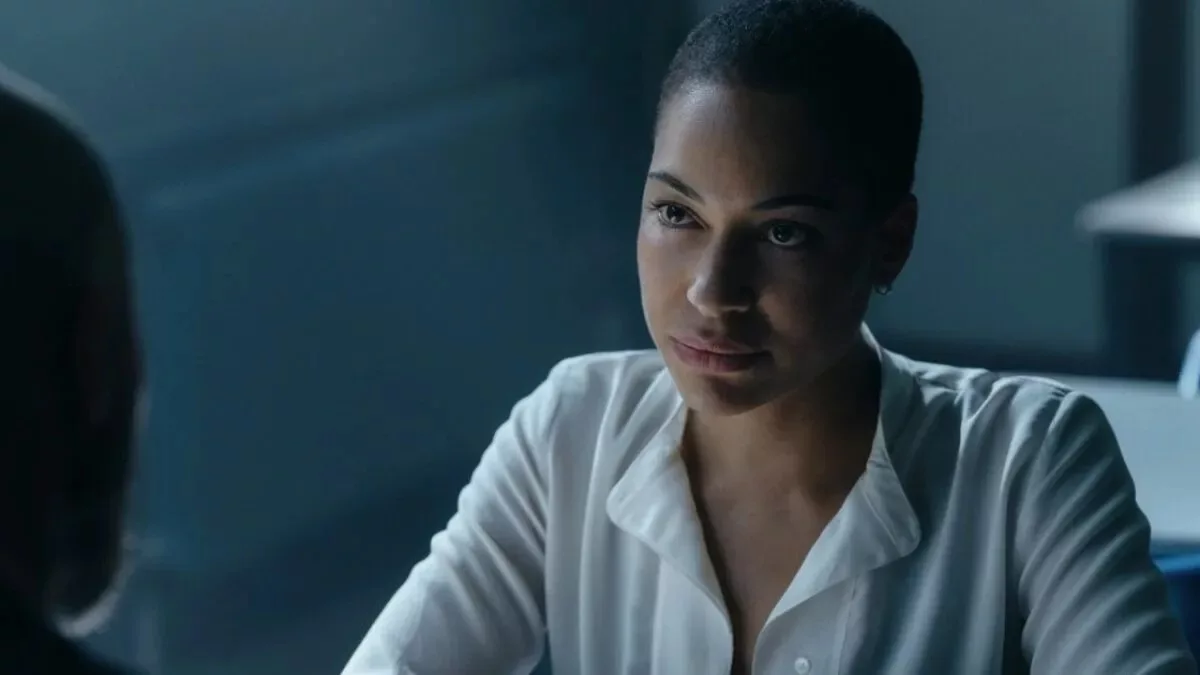A provocative new crime drama has entered the scene in Apple TV+’s eight-episode series Criminal Record. With versatile actor Peter Capaldi of Doctor Who fame and the always compelling Cush Jumbo (The Good Fight) leading the cast, this thriller comes stacked with acting talent poised to spar. Creator Paul Rutman, known for exploring complex social issues in series like Indian Summers, brings his penchant for unraveling institutional dysfunction to the London police force.
Centered around a decade-old murder case gone cold, Criminal Record ignites when Detectives Sergeant June Lenker (Jumbo) questions whether the right man is behind bars. Her investigation dredges up misconduct tied to Detective Chief Inspector Daniel Hegarty (Capaldi), the reputable veteran cop who originally closed the case. As June peels back the layers of corruption and cronyism at play, she faces mounting hostility from the predominantly white upper ranks shielding their own.
More than just a gritty whodunit, Criminal Record confronts the racism and boys club mentality infecting law enforcement. Through June’s eyes, we see precisely how prejudice colors police work, from casual microaggressions to full-blown obstruction of justice. With an insider’s look at the “blue wall of silence,” the show dares to explore difficult realities around abuses of power and the struggle for accountability. Bolstered by two charismatic leads, Criminal Record brings a smart, socially-conscious edge to Apple’s lineup of prestige dramas. Strap in for a tense thrill ride into moral gray areas with no easy answers in sight.
Stars Align for Compelling Lead Turns
Any crime thriller lives or dies on the strength of its leads, and in Cush Jumbo and Peter Capaldi, Criminal Record has struck gold. As the tenacious DS June Lenker, Jumbo brings a captivating combination of strength, vulnerability and complexity. Her wide eyes convey June’s sharp intellect, taking in her surroundings with insight and suspicion. Yet we also see flashes of self-doubt creep in when she’s gaslit by dismissive higher-ups. Jumbo finds riveting emotional notes to play as June’s confidence wavers yet her resolve to uncover the truth remains intact.
Meanwhile, Capaldi makes an inspired against-type choice as the intimidating DCI Hegarty. Trading in his eccentric charms from Doctor Who for a perpetually dour glare, Capaldi’s somber body language and gravelly baritone become weapons of fear. His Hegarty excels at keeping his cards close to the vest, but Capaldi strategically unveils slivers of the man’s inner turmoil. Whether palpably recoiling from June’s inquiries or dutifully visiting his ailing daughter, Capaldi locates the human behind Hegarty’s hardened exterior.
Together, Jumbo and Capaldi have a combustible chemistry primed to explode. Their ideological clashes and ticking power struggle electrify each scene, augmented by the dubious loyalty between both leads and their supposed allies. Are Hegarty’s old guard partners truly on his side or hanging him out to dry? Does June’s husband genuinely support her, or inadvertently contribute to the boys’ club culture? The show keeps us guessing with richly drawn shades of gray.
While Jumbo and Capaldi justly dominate the spotlight, the ensemble provides sturdy support. As Errol’s grieving mother, Cathy Tyson simmers with dignified determination to upend his conviction. Stephen Campbell Moore exudes an infuriating blend of sensitivity and obliviousness as June’s spouse. Meanwhile, Aysha Kala makes a strong impression as Errol’s fiery lawyer Sonya, expertly telegraphing her barely contained contempt for the police’s mishandling of her client.
If the supporting players feel somewhat thinly sketched, even the principals are not immune to narrative issues. The show seems overly enamored with using Errol as a tragic symbol of the system’s failings rather than fleshing out his humanity. And for all their magnetism, June and Hegarty’s backstories get short shrift early on before eventually accruing emotional weight. Yet capable acting smoothed over any shortcomings in writing to drive home the show’s provocative ideas.
With its propulsive star turns, Criminal Record delivers scorching dramatic heat. Jumbo’s intrinsic strength aligned with vulnerability make June an ideal conduit to detail the insidious impacts of racism within a broken institution. Meanwhile, Capaldi peels back Hegarty’s layers of deception to reveal relatable human frailties fueling his obsession with self-preservation. Together with an impressive ensemble, the leads provide the beating heart that animates this timely thriller.
“Unveil the gripping crime thriller set in the icy plains of Montana with our Blood for Dust review. Follow a desperate salesman entangled in a dangerous underworld, delivering edge-of-your-seat tension and stellar performances.”
Hard-Hitting Content Anchored by Smart Writing
Beyond its compelling character dynamics, Criminal Record impresses with writing that punches above its weight. Creator Paul Rutman dexterously handles the show’s complex ideas around racism and unaccountable policing without excessive moralizing. His grounded dialogue rings true across the societal spectrum, from Errol’s grieving mother to June’s well-meaning yet clueless husband. Weaving timely themes into the show’s backbone rather than tacked on PSAs, Rutman maintains nuance even amid institutional rot.
The show pulls no punches confronting the racism embedded in the London police force. Be it backhanded compliments about June’s articulateness or assumptions that her Black colleague must be her instead, microaggressions abound. The writing carefully outlines systemic issues without condemnation, enhanced by Jumbo’s understated reactions wordlessly conveying her simmering inner turmoil. June faces gaslighting from higher-ups protecting their own, but the show resists framing all individuals as equally complicit.
While certain dirty cops like Cardwell and Guilfoyle openly trade in prejudice behind the scenes, the far more insidious Hegarty publicly pays lip service to diversity initiatives while quietly undermining June. His weaponization of buzzwords like “unconscious bias” to discredit June’s investigation demonstrates how empty platitudes get co-opted by those benefitting from the status quo. It’s a cutting critique made more potent by Capaldi’s superficial compliance masking cold calculation.
Beyond examining racial biases, Criminal Record confronts the brotherhood of blue looking out for their own whatever the cost. The pushback June faces for questioning a seemingly airtight case illuminates the thin blue line mentality where cops cover for fellow cops’ misdeeds. Faced with sacrificing one young Black man or destroying the legacies of multiple high-ranking white officers we see how self-preservation wins out. The show highlights the insularity that allows corruption to fester behind the badge.
For all its weighty commentary, the show resists devolving into a polemic screed. Rutman’s sharp writing keeps tension high regarding the central murder mystery even as it navigates societal woes. The core whodunit maintains urgency and high personal stakes for its key players intersecting with institutional interests. Well-placed reveals parsing out the tangled truth behind the cold case prevent the show from buckling under its conceptual weight. Flawed yet sympathetic perspectives get their due, forgoing easy heroes and villains.
Rutman threads the needle in delivering a sobering critique of systemic racism without losing sight of relatable human foibles enabling the cycle. The narrative maintains momentum by rooting its sociological themes in intimate character choices rather than speechifying. Though still an unfinished journey, Criminal Record makes impressive headway bridging entertainment and insight.
Moody Visuals Set the Tone
On the surface, Criminal Record’s cinematography checks the boxes for the dark, gritty aesthetic that’s become ubiquitous for any self-respecting crime drama. Bleached of vibrant colors, the show lives in a world of muted grays and blues that echo the gloomy London skies. The palette conveys the bleakness of a story mired in tragedy and ethical compromise.
Yet despite the risk of fading into visual white noise, director Jim Loach keeps the imagery sharp, finding striking frames within the intentional dreariness. The policework cuts between the frenzy of bustling precinct bullpens and claustrophobic interrogation rooms, situating players within opposing dynamics. We get distance overhead shots establishing the alienating environment June faces as an outsider, followed by tense close-ups hanging on her reactions to emphasize shifting power dynamics.
Clever shot framing manifests the physical and psychological gulf between June and Hegarty, with Capaldi’s imposing figure often shot from below to underscore his authoritative presence leaning into her space. Yet the camera also closes in on his furrowed brow, allowing glimpses of his steely veneer showing cracks from internal strain. Meanwhile, June is captured in loser shots highlighting her isolation, conveying her understandable paranoia about being watched.
If the color grading trends generic, Loach’s sharp grasp of composition within that world proves anything but. He maximizes the visual real estate to bolster performances, allowing two consummate actors to command scenes with poise. Any visual monotony gets offset by ingenious blocking that externalizes the leads’ churning inner turmoil, be it righteous anger or nagging guilt.
The imagery syncs with Rutman’s understated writing rather than calls undue attention to itself. For a series built on slow-burning tension, the atmospherics synergize with grim subject matter. Striking a balance between the visually lush and the deliberately dreary, Criminal Record’s muted palette lets damning themes around corruption and complicity simmer to the surface.
Measured Pace Belies Riveting Storytelling
Unfurling at a leisurely burn, Criminal Record takes its time unspooling secrets around a decade-old murder mystery. Rather than fast-paced thrills, the show opts for slow reveals meted out in fragments week to week. This meditative approach walks a risky tightrope, needing compelling ingredients to justify the extended runtime. Fortunately, creator Paul Rutman recognizes thatJune and Hegarty’s tense rivalry contains enough dynamite to avoid imploding from languid storytelling.
The core investigation into a potentially wrongful conviction provides an sturdy hook bolstered by themes of racial prejudice and abuse of power. Spotlighting tensions between June’s quest for justice and Hegarty’s self-preservation, each incremental truth uncovered raises the stakes. Their philosophical clash gains resonance from Capaldi and Jumbo navigating moral gray areas. We understand Hegarty’s desire to safeguard his legacy and June’s frustration with being gaslit, even as their tactics grow questionable.
This measured unraveling of secrets allows characters to retain complexity. One-note heroes and villains would feel uncomfortably simplistic for such thorny territory. Instead, the slow drip of reveals lets us stew in ambiguity, pondering each player’s motives and degree of complicity. When late-stage twists land regarding the men behind Hegarty’s maverick ways, they reframe his containment efforts as tragic failings of a flawed system rather than one bad apple. It’s a gut punch made possible by the show’s patience establishing investment in his perspective.
Draggy sections surface on occasion when the plot machinations require appreciable legwork. Extended focus on Errol’s legal team navigating appeals or chamber meetings covering bureaucratic minutiae points to filler padding out the slim serialized narrative. Yet before inertia sets in, a new wrinkle in the central mystery or a breakthrough in the leads’ rivalry regains momentum to carry through slow patches.
At its best, Criminal Record justifies its unrushed pacing allowing characters room for complexity. At its periodic weakest, the show gets mired extending limited plot threads stretched over a season-long arc. But Capaldi and Jumbo’s consistently engaging performances maintain engagement through lulls. For the most part, Rutman plays a long game focusing on resonant themes over pulp thrills, a choice paying maturity dividends.
Imperfect Yet Compelling Crime Storytelling
At its best, Criminal Record fires on all cylinders. Potent themes bolster the intrigue, charismatic leads compel, and measured pacing allows ethical complexities to breathe. Slick production values visually complement the show’s sobering commentary on racism infecting justice. For patient viewers, a thriller centered on humanity’s shortcomings not simplistic heroes triumphs.
Yet the show struggles with consistency across its eight-episode first season. Supporting characters often feel more symbolic than fully realized, and elongation of limited plot points sometimes stalls momentum. Navigating provocative ideas around prejudice proves easier than untangling the central murder mystery, which culminates in disappointing simplicity compared to the intricate build-up.
But transitory weaknesses fade in recollection next to more resonant strengths. Jumbo continues her streak of outstanding performances, perfectly calibrating June’s heroism and hubris while confronting demoralizing opposition. And Capaldi delivers a masterclass in duplicity belying emotional transparency. Together they form a fascinating core in ethical disagreement. Add in Rutman’s knack for exploring socially relevant themes without sermonizing, and Criminal Record carries worth despite uneven concoction.
The show makes smart points about diversity for the sake of optics rather than meaningful change, how bias impacts whose voices get heard, and the temptations of justifying incremental progress in the face of glacial systems. Its insights might not break new ground in viewing law enforcement’s shortcomings, but remain soberingly applicable. Flawed institutions emerge less from individual bad apples than overwhelming barrels rotting minds and morals. It’s a depressing diagnosis made compelling through Capaldi and Jumbo’s quagmire.
For audiences craving more than empty suspense from their police procedurals, Criminal Record injects ethical heft into its central mystery. Smart commentary and powerhouse performances outweigh sporadic narrative issues and production missteps. With room for growth should a second season arise, the show earns a tentative recommendation for genre fans seeking resonating substance over purely adrenalized style.
The Review
Criminal Record
Bolstered by the magnetic presence of Jumbo and Capaldi, Criminal Record overcomes intermittent pacing issues to deliver a brooding, socially-conscious thriller. Timely commentary on racial bias melds with an absorbing central mystery, even if certain plot threads and characters prove less riveting. For patient viewers, smart writing and charismatic leads outweigh the show’s sporadic narrative shortcomings.
PROS
- Compelling lead performances from Jumbo and Capaldi
- Timely themes tackling racism and police corruption
- Strong social commentary without excessive moralizing
- Measured pacing allows ethical complexity
CONS
- Uneven development of supporting characters
- Central murder mystery resolution lacks intricacy
- Plot tangents contributing minimal payoff
- Periodic momentum slowdowns
